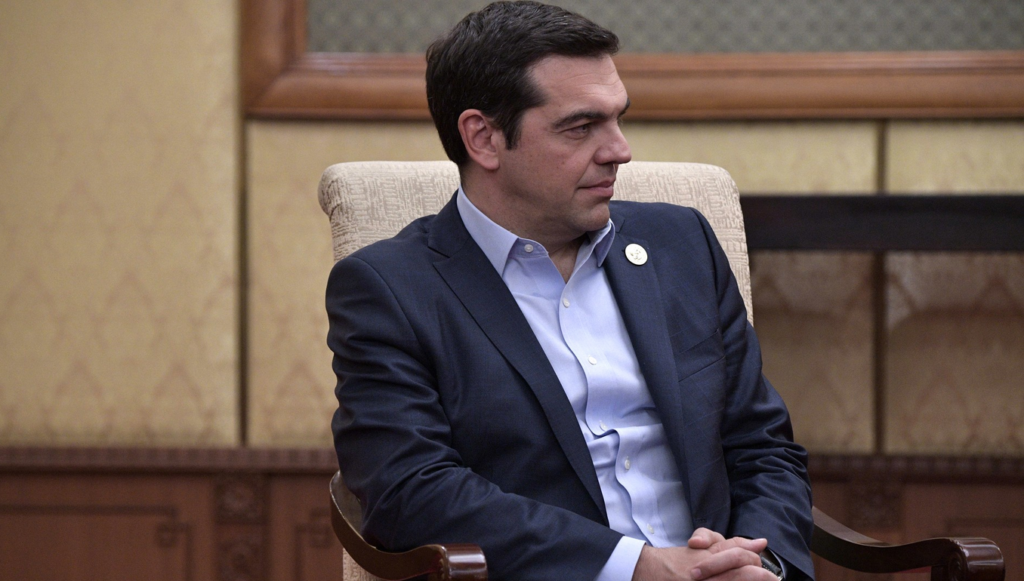Following the 2008 financial crisis, public debt in Greece entered a path of uncontrollable growth, far steeper than the rise experienced in other developed economies. The main culprit here was the scale of fiscal deficits.
International markets rapidly branded Greek debt as unsustainable. But a country default was technically avoided by allowing the European Commission (EC), the European Central Bank (ECB) and the International Monetary Fund (IMF) – commonly known as The Troika – to step in and finance debt repayments in exchange for a harsh adjustment programme.
The bailout agreement or the so-called ‘Memorandum’, aimed at restoring public finances, promoting reforms and stabilizing public debt which, at that time, stood at a staggering 127% of GDP.
However, and contrary to official expectations, public debt continued to rise, while the economy was experiencing a deep and unprecedented recession.
It was at around this time that a young civil engineer first made his mark not only in the turbulent world of Greek politics but all across Europe.

Alexis Tsipras was born in Athens on 28 July 1974, just after the fall of the Greek military junta that had ruled the country for seven years.
His father was a civil engineer, who provided enough for the family to live comfortably .
Young Alexis lived near the Apostolos Nikolaidis stadium of his beloved Panathinaikos football club, and he initially seemed more interested in sport than in politics.
But then everything changed at school when he joined the Young Communists Society; that’s where he developed his talent for rhetoric.
When the government proposed a new privatisation bill for the education sector in 1990, the 16-year-old Tsipras organised an occupation of his school to oppose the reforms, locking teachers and other pupils out.
He was interviewed on television, and he immediately showed his aptitude for challenging authority. He declared :“We want the right to judge for ourselves whether to skip class”.
He remained active in student politics while training as a civil engineer at the National Technical University of Athens.
In 1999, he became the secretary of the youth branch of the leftist Synaspismos Party, which would later become part of SYRIZA.
SYRIZA is a Greek acronym for Coalition of the Radical Left, comprising socialists, Maoists, Trotskyists and Greens.
Learning the rules
Synaspismos – the word means ‘coalition’ – commonly abbreviated to SYN, had always been a minor force in Greek politics. It was founded in 1991 and dissolved in 2013.
A Marxist-socialist party that was pro-Europe, it usually barely managed to scrape up enough votes to overcome the 3% barrier and elect a handful of MPs in parliament.
Promoting a platform that included environmental and welfare issues, as well as immigration reform, it was always considered a benign, non-threatening political entity.
This was the time of monolithic unilateral governments led by either the Social Democrats of PASOK or the conservatives of New Democracy, giant parties that usually swept a combined 80% of the popular vote.

Smaller parties like SYN or the Communists never had real power and were all but inconsequential compared to the behemoths that ruled Greece.
Alexis Tsipras rose quickly in those close ranks.
Then, in 2006, party leader Alekos Alavanos surprised many by selecting Tsipras to be SYN’s candidate for the mayorship of Athens.
Coming up against a cadre of seasoned politicians, this fresh-faced 32 year old managed to get an amazing 10,5% of the vote that was only good for third place, but was considered a triumph for his tiny party.
Now everybody knew his name, and everyone recognized his face.
Two years later, Alavanos decided to step down as party leader, and promoted him as his successor.
Tsipras proceeded to dominate the internal election, obtaining 70% of the votes and thus becoming the youngest party leader in the history of the Greek republic.
At 34, he was in control of a small leftist party in a small country in Europe.
For people within his political spectrum, this was as far as one could conceivably get.
However, it became evident at the time that Tsipras was not above political machinations. SYN was by then the largest member of a broader coalition of about a dozen different leftist parties, SYRIZA.
This coalition participated in elections as a unit, led by SYN’s leader.
By the time of the 2009 general election, Alekos Alavanos, Tsipras’ predecessor, was cast aside and would not even be a candidate for a seat in parliament.
He would later leave the party altogether.
Immediately after the election, which gave SYRIZA a slightly disappointing 4.6% and 13 seats in parliament, Fotis Kouvelis, a founding member of the Greek Left Party and former Justice Minister also departed, going on to create a new party called Democratic Left.
Within those few months Tsipras had managed to remove both conceivable internal opponents and consolidate his power within his small organization.
This would turn out to be key.
Because in the meantime, the Greek economy and the entire Greek political system was about to implode.
The woman behind the man
Part of Tsipras’ appeal was is his informality – he said he spoke for working Greeks, frustrated by a corrupt establishment that has bled the country dry.
He was also seen as both approachable and rebellious, as his penchant for motorbikes and open-necked shirts suggested at the time.
He once said that he would wear a tie when Greece got its debts written off.
Tsipras is a self-avowed atheist. He broke with tradition and took a secular oath of office when he became Prime Minister. He lives with his long-time partner, computer engineer Peristera ‘Betty’ Batziana, but remains unmarried.
Apparently, she is even more radical than Tsipras, and he has hinted that she might have left him if he had yielded to Greece’s creditors.
Even though Alexis Tsipras has been described as the ‘Greek Che Guevara’ it is believed that the strong-willed Peristera Batziana, who has been by his side for 30 years, is in fact the true radical and the power behind the throne.
Forty-four-year-old Peristera who comes from Thessaly, in central Greece and is the mother of his two children, encouraged Tsipras to enter politics rather than embark on a career in sports.
They first met in 1987 when they both attended secondary school.

Later, it was Miss Batziana, already a member herself, who convinced Tsipras to join the Communist Youth of Greece in 1990, despite his middle-class background.
In 1991, when students in Athens revolted against unpopular education reforms, they both led protests at the Ampelokipoi Branch High School, as leaders of the student movement.
Later, they both went on to university and graduated as engineers.
Peristera Batziana graduated from the University of Patras in electrical engineering, and according to her friends, she is ‘strong-willed, militant and dynamic’.
She once took one of her professors to court when he tried to undermine her work on a doctoral thesis, according to the Greek Reporter, a leading international Greek news network.
She reportedly also hates spending hours shopping and doesn’t like going for regular trips to the hairdresser.
Unlike the first ladies that have come before her, Miss Batziana has stayed away from the glamour that comes with the Maximos Mansion, the official seat of the Greek prime minister and has avoided the media spotlight.
The couple have in fact, made very few public appearances.
In his youth, Alexis Tsipras was a motorbike-riding Communist activist and rather than getting married in a civil or religious ceremony, preferred to take advantage of the cohabitation law that has been in effect since 2009.
Tsipras and Peristera Batziana are the first unmarried couple to occupy the Maximos Mansion. Before them, it was French president François Hollande and the German president, Joachim Gauck who had done the same.
These arrangements are signs of how European attitudes about families have changed over the years.
Alexis Tsipras, the unconventional political leader who is regarded as a true man of the people, used to take out the rubbish, is an avid football fan and put their boys, Phoebus and Orpheus, to bed. He also added the name Ernesto to his youngest son’s middle name… a tribute to Che Guevara, one of his idols.
A step back in time
As we shall see shortly, in January 2015, SYRIZA became the first radical left party to form a government in Europe since WWII.
It plunged Europe into a four-month confrontation over Greece’s €320 billion debt.
But what is SYRIZA and where did it come from ?
The far left in Greece has deep roots. The communist-led resistance beat the Wehrmacht, only to clash with the British army in 1944.
Then came a two-year civil war in which the Left was crushed.
Many of SYRIZA’s leaders have grandfathers who were jailed, killed or tortured at that time.
And many of SYRIZA’s older activists were here in the 1970s when students overthrew a military junta. It was out of the so-called New Left – communists who rejected Moscow – that SYRIZA emerged.
But for seventy years, Greece was ruled by political dynasties. One conservative, one socialist and both enmeshed in a system where the rich payed little tax and where corruption was rife.
In 2002, Greece joined the Eurozone. At this point SYRIZA, still a loose coalition of the radical left had less than 4% support.
As the Lehman Brothers crisis plunged Europe into recession, Greek debt spiralled out of control. In 2010, the socialist government of George Papandreou went cap-in-hand to Europe for a bail-out…and so, austerity began.
By now of course, SYRIZA had a new leader : Alexis Tsipras.
And soon, it had a whole new demographic from which to draw support.
The occupation of the squares in Athens in 2011 brought tens of thousands of young Greeks into political activism, and many joined SYRIZA.
Meanwhile, the socialist government fell, to be replaced by a conservative-led coalition and the harshest austerity programme in modern history.
Unemployment soared to 25%…family incomes fell by 40%…
In the 2012 election, SYRIZA lost by just 2 percentage points. Support for the old socialists collapsed and SYRIZA led the fight against austerity.

What tipped the balance ? Fascism and corruption.
When the fascist Golden Dawn party began terrorizing immigrants, many saw the conservative-led government as colluding with them and the police as their allies.
While the ‘Troika’ imposed harsh austerity, it seemed unmoved by the rampant corruption in the main Greek parties.
So, by January 2015, Greeks who wanted an end to austerity, an end to corruption and a firm line against far-right violence swung towards SYRIZA. Many Greeks had high hopes.
Alexis Tsipras’ first symbolic act was to visit the monument to resistance fighters murdered by the Germans. He has in fact, called for Germany to pay war reparations.
In the rest of Europe, such overt references to Germany’s past are often seen as taboo.
But bold gestures like these go down well in Greece, where Berlin is regularly demonised for its austerity demands.
Such defiance helped Tsipras’s ratings soar.
And while SYRIZA ruled in coalition with a small nationalist party, SYRIZA’s own willingness to combine left-wing politics with the defence of Greece’s national interest attracted many voters from the right and centre.
So, SYRIZA is a hybrid…an old, disciplined Marxist party combined with a young generation from the Occupy Movement, the Greens and Feminists and later, thousands of ex-socialists.
But the key word was coalition.
As it struggled with debt, austerity and severe economic downturn, the question was : would it all hang together or split apart ?
In the thick of battle
SYRIZA swept forward like an incredible wave when Tsipras became its leader.
In the 2004 elections, it won just 3.3 per cent of the vote but later, the party dominated Greek politics, coming first in the January 2015 elections, with 36.3 per cent.
In fact, that came on the back of a close second place in the 2012 elections, as well as a high-profile run to become president of the European Commission in 2014.

© Governement of Greece
The 2015 election sent a wave of fear across Europe, as countries began preparing themselves for the EU’s first radical left government.
Tsipras he fell short of an outright majority by just two seats, but he reached an agreement to form a coalition with the right-wing populist Independent Greeks.
He had an electrifying impact on Greek politics, but across Europe, where his appeal was needed most, it fell flat; other European leaders distanced themselves from what they saw as a liability mainly because of his aggressive style, which was at odds with their methods.
Tsipras did not get much help either from his preening and flamboyant Finance Minister Yanis Varoufakis, who proved so antagonistic that he had to be left out of the Euro negotiations.
There came a point when it looked as if the deadlock could have been resolved; the mood in the eurozone had turned against severe austerity.
For quite some time, it had been tacitly accepted that Greece’s debts were so high that most would have to be written off. The IMF itself had said so at one point.
And it appeared that Tsipras could have come to some agreement with his creditors on reforms aimed at more effective tax collection, especially on Greece’s super-rich.
There followed a number of one-on-one meetings with other leaders, including ECB head Mario Draghi and Pope Francis. But instead of reassuring them, Tsipras lost allies.
At that particular moment, Greece had potential friends in France, Italy, Spain and Portugal, who also suffered during the euro crisis, but launched much-needed reforms to turn their economies around. But due to his aggressive rhetoric, which did him few favours throughout his time in office, Tsipras alienated them instead.
And in June 2015, a time which may turn out to be one of the most critical periods in the EU’s history, his impulsiveness was on display again.
He demanded a number of summits with his counterparts in Brussels, and actually obtained them. He came within reach of an agreement on extending the bailout, but instead, Tsipras walked out and announced a referendum to decide whether Greece should accept the bailout conditions proposed by the EC, the IMF and the ECB.
However, there was still hope, even in the hours before Greece defaulted, that he would show up in Brussels to accept a deal and cancel the referendum.
But this wasn’t to be.
Tsipras recommended a “No” vote and on 3 July, during an address to some 25,000 people gathered in Syntagma square, in front of parliament, he rejected some leaders’ warnings that a “No” result in the referendum could force Greece to leave the eurozone.
He declared “On Sunday, we are not simply deciding to remain in Europe we are deciding to live with dignity in Europe”. The result of the referendum was 61.3% for the “No” vote.
Tsipras received a letter from Fidel Castro, congratulating him for the victory of the “No” vote.
Castro also added that the peoples of Latin America and the Caribbean were in admiration for the courage of the Greek people.
Much of Tsipras’s strategy had been based on the assumption that his creditors would do all they could to keep Greece in the euro.
But patience was running out across Europe. German Chancellor Angela Merkel was ready to call his bluff, and together with almost all other eurozone leaders, she was prepared to cast aside Greece, if no solution was found.
Decline and fall
It was in Athens’ Syntagma Square that Alexis Tsipras and his finance minister, Yanis Varoufakis urged Greeks to reject ultimatums and blackmail, when the extremely severe terms of a third EC-IMF-ECB bail-out package were put to the electorate in a referendum in July 2015.
And it was also here that thousands later came to dance and rejoice when the result – an overwhelming 61.3% ‘no’ vote was announced.
It is interesting to note that this great populist experiment that began in Athens, reappeared years later in other EU capitals.
But it only took one week for the relentless leader to do a complete about turn. He approved a €100bn EU-funded bailout programme that demanded some of the deepest cuts any government had been asked to apply since the scale of Greece’s insolvency first emerged in late 2009.
Varoufakis categorically refused to buy into this agreement and resigned. He went on to contest the July 2019 elections at the head of his MeRA25 party.
And again, thousands gathered in Syntagma Square for these elections.
Many waved the red, white and purple flags of SYRIZA, the once-radical leftist party whose leader they had come to hear.
And when Alexis Tsipras appeared on the platform in front of the parliament building, a great roar of approval went up…the countdown had begun.
The pugnacious prime minister delivered his main pre-election address in proved to be an unusually low-key campaign for the snap election in July 2019.
But for Tsipras, it was showtime, and as usual, he didn’t disappoint.
He put forth as much effort as he could muster : “They think they’ve got rid of SYRIZA, they think they’ve got rid of the left,” he roared from the podium which was also encircled by gay supporters waving rainbow flags. “Well, the battle is only beginning. We can do it! We can pull off the greatest reversal in history.”
So, four years after his brilliant victory in 2015, the charismatic tribune who held high the hopes of progressive factions in Greece and elsewhere had a real battle on his hands.
SYRIZA is today in a rather desperate position. The defeat it suffered in European parliamentary elections in May was seen as a precursor for a defeat likely to be comparable, if not bigger.
The party emerged 9.5 points behind the centre-right opposition in its first contest at the ballot box since 2015.
Polls in Greece have clearly shown SYRIZA’s waning popularity and the party that stormed to power at the height of the country’s financial crisis is now a shadow of its former self.
Surveys showed its rival, New Democracy, was between eight and 13 points ahead.
On the Monday following the voting, the Maximos Mansion – the ornate neoclassical building housing the prime minister’s office and official residence – changed tenants and Kyriakos Mitzotakis, a former banker and leader of New Democracy moved in.
The 51-year-old could not be more different from his leftist opponent.
Mitzotakis is the son of a past prime minister, whose family has been compared to the Kennedys by the Greek press. He is himself Harvard-educated, his sister Dora was foreign minister, and his nephew Kostas is Athens’s mayor-elect. The 51-year-old could not be more different to his leftist opponent.

For Tsipras this is probably his farewell appearance – the result of his failure to challenge the EU and deliver on his promise to eradicate austerity. But is very unlikely he will go down without a fight.
The threat of an exit from the eurozone may have caused him to U-turn, and to adopt the neoliberal reforms he had once so forcefully denounced, but he is still in the ring and defending himself.
Many former SYRIZA ministers are dismayed that voters today seem determined to punish Greece’s first leftist government that they insist, went out of its way to help the more vulnerable and poor.
But they also agree that a number of mistakes were made and can also understand the reasons why there is disappointment over the way the leftists behaved while in power.
For instance, Tsipras developed a taste for cigars and caused some embarrassment when he was seen enjoying his holidays with his family on a yacht belonging to a wealthy shipowner.
Charges were made that SYRIZA, while in power was opportunistic, acted with high-handedness, and ultimately, not any better than other parties. The reason of course is that it joined forces with the far-right Independent Greeks party.
Alexis Tsipras is now 45 years old and still quite young. He says : “Whether we are in power, or not, we are here to stay”.
Only the future will tell whether this will be the case. But whatever happens, for the young man who, 24 years earlier began to fight for his rights at school, this has been quite an achievement.


